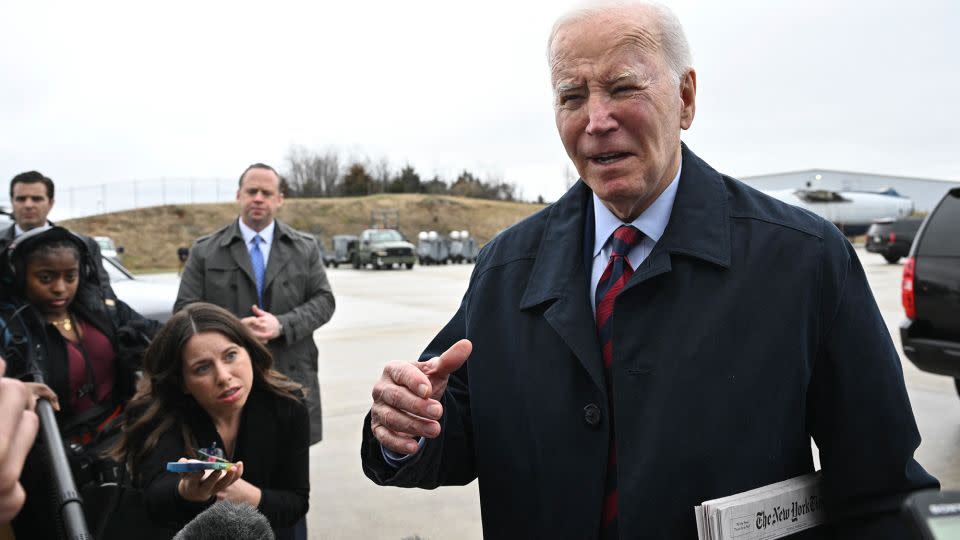Hamas responds to ceasefire proposal but accuses Israel of ‘stalling’
- Oops!Something went wrong.Please try again later.
Hamas said Tuesday there could be no “exchange of prisoners” before a permanent ceasefire and a full Israeli withdrawal from Gaza, as it responded to proposals from Egyptian and Qatari mediators.
“The security and safety of our people will not be achieved except through a permanent ceasefire, the end of the aggression, [Israel’s] withdrawal from every inch in Gaza…and the entry of aid to our people in Gaza is our utmost priority,” Hamas senior leader Osama Hamdan told a news conference in Beirut.
“Any prisoner exchange will not be completed except after the completion of all this.”
Hamas’ response comes as negotiators race to reach a deal that would pair a pause in fighting with the release of Israeli hostages held in Gaza before the Muslim holy month of Ramadan. Whether that deadline can be met remains uncertain. Israeli Prime Minister Benjamin Netanyahu has previously ruled out stoping the military campaign before Hamas is completely destroyed.
Hamdan on Tuesday also accused Israel of stalling on reaching an agreement and warned that the negotiations would not be “open-ended” as Israel continues its offensive in Gaza.
“We have affirmed our conditions for a ceasefire: complete withdrawal from the sector, the return of displaced persons to the areas they left, especially in the north, and the provision of sufficient aid, relief, and reconstruction,” he said.
Reuters and Al Jazeera reported last week that Hamas was reviewing a draft proposal for an initial ceasefire lasting roughly six weeks, during which 40 Israeli hostages would be exchanged for 400 Palestinian prisoners.
Hamdan’s response came just hours after US President Joe Biden said a potential ceasefire was “in the hands of Hamas” as he boarded Air Force One at Hagerstown airport.
Biden said the “Israelis have been cooperating” and that a ceasefire is necessary.
“We need a ceasefire,” he said, calling the deal on the table a “rational offer” and saying the Israelis had agreed to it.
“We have to see what Hamas does,” he said.

Race against the clock
The Biden administration has been racing against the clock to secure a ceasefire before Ramadan, which is expected to begin March 10, fearing any aggressive military push by Israel during the Muslim holy month would only further inflame tensions across the region.
Biden said Tuesday that without a deal by Ramadan, the situation in Israel and specifically Jerusalem would be “very, very dangerous.”
Negotiators have been gathered in the Egyptian capital Cairo since Sunday for talks on a deal, but Israel did not send a delegation, an Israeli official told CNN, despite increasing international pressure to end hostilities and allow for a desperately needed surge of humanitarian aid.
An Israeli official told CNN that the reason behind the decision was that Hamas had not responded to two Israeli demands: a list of hostages specifying which are alive and which are dead; and confirmation of the ratio of Palestinian prisoners to be released from Israeli prisons in exchange for hostages.
When Biden was asked about his relationship with Israeli Prime Minister Benjamin Netanyahu, he said it was “like it’s always been.” And he repeated his assertion there were “no excuses” for Israel not to allow more aid into Gaza.
The US has become increasingly vocal about the humanitarian catastrophe in Gaza, where the United Nations warns hundreds of thousands of people are on the brink of famine and US ally Israel continues to obstruct the bulk of aid deliveries.
On Saturday, the US made its first humanitarian airdrop into the strip — 66 bundles containing meals but no water or medical supplies, a US official said. Aid groups have criticized the air drops as an ineffective and degrading way to get aid to Palestinians in Gaza, with the International Crisis Group’s UN director saying they are at best a “temporary Band-Aid measure.”
One of the strongest rebukes of Israel by a US official to date came from US Vice President Kamala Harris, who on Sunday forcefully called for more humanitarian aid into Gaza, saying that people in the region are “starving” in the face of “inhumane” conditions and urged Israel to do more.
This is a developing story and will be updated.
For more CNN news and newsletters create an account at CNN.com

